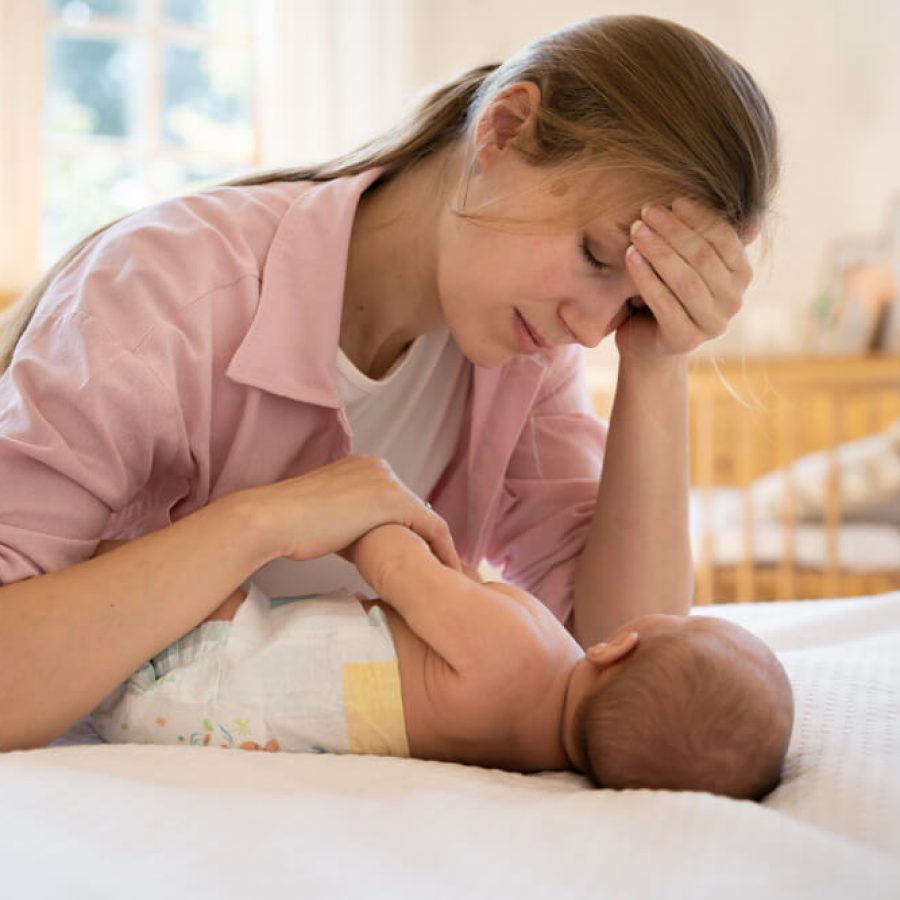When you are gifted with a newborn, your whole life might revolve around them. Despite that, the emotional wellbeing of the mother can not be overlooked, because she is the main connection with the baby after birth. Learn more about postpartum depression symptoms and when it’s time to seek help.
Postpartum depression (PPD) can be overcomed, as long as the right treatments are employed. You can go through it, and still build a loving relationship with your family!
Here are the basics you need to know about the topic.
What Is Postpartum Depression?
Postpartum depression is a medical condition that causes intense and prolonged negative feelings after a woman gives birth. It causes strong sensations of sadness, anxiety, apathy and tiredness, causing the mother to almost feel paralyzed and really overwhelmed.
Postpartum depression is common, affecting 1 in 7 parents. However, it is not to be confused with another very common condition that moms face after giving birth, known as baby blues.
Baby Blues or PPD?
Baby blues is even more common, affecting up to 75% of moms after delivery. Generally speaking, the symptoms are very similar to those experienced in PPD, but the difference in duration makes it less worrying.
The symptoms of baby blues can happen right after birth, or up to 35 days after. It usually lasts just for a couple of weeks, and then the intensity of symptoms diminishes.
How Does Postpartum Depression Affect The Mother?
After giving birth, a woman’s body is completely focused on getting itself back to normal, which includes equalizing hormone levels and recovering from the physical load of the delivery.
As if this is not overwhelming on its own, having to deal with intense and negative feelings adds in another layer of suffering to a mother who’s already struggling.
Make no mistake: caring for the health and happiness of Mom, who is often the main caretaker of the newborn, is also caring for the tot’s wellbeing.
Can PPD Be Prevented?
Since postpartum depression is not something caused by something that the mother has done, it’s not likely to be prevented.
However, to decrease the chances of either baby blues or PPD occurrences, it’s important to take care of her health as a whole during pregnancy, making sure she is mentally, psychologically and emotionally in a good shape.
Can Postpartum Depression Affect The Baby?
Since the mother is not feeling good about herself, it can interfere with the baby’s overall health. She might experience:
- Hard timing identifying when the baby needs medical help;
- Not being able to breastfeed the newborn;
- Not attending postpartum checkups;
- Not implementing security measures for the baby, like putting them to sleep in an inappropriate manner.
Most Common Postpartum Depression Symptoms
If you’re experiencing any of the following symptoms for more than 2 weeks, seek medical assistance immediately.
You can refer to the OBGYN you’ve consulted during your pregnancy or your baby’s pediatrician.
- Experiencing frequent irritability or sudden mood swings;
- Persistent feelings of sadness or despair;
- Struggling with overwhelming guilt, shame, or a sense of worthlessness;
- Changes in appetite, either eating significantly more or less than usual;
- Disruptions in sleep patterns, including insomnia or excessive sleeping;
- Episodes of uncharacteristic crying or deep sorrow;
- A noticeable loss of interest or pleasure in activities that were once enjoyable;
- Isolating oneself from family and friends;
- Disturbing thoughts of causing harm to yourself or your baby.
It’s paramount that Moms don’t lose sight of themselves and their own health, especially after delivery. Always seek for specialized medical help, and follow thoroughly the instructions you’ve been given.
Please, do not substitute medical advice for informative content you find on the internet.
Keep in mind that PPD is not caused by the mother. It’s a common condition, and no one can be blamed for its happening. If you know anyone struggling with postpartum depression symptoms, encourage them to seek professional help, and be yourself a loving companion to help them go through this period.
Continue your quest on embracing motherhood and all its intense feelings: here are a few tailored pieces of advice for new moms.


